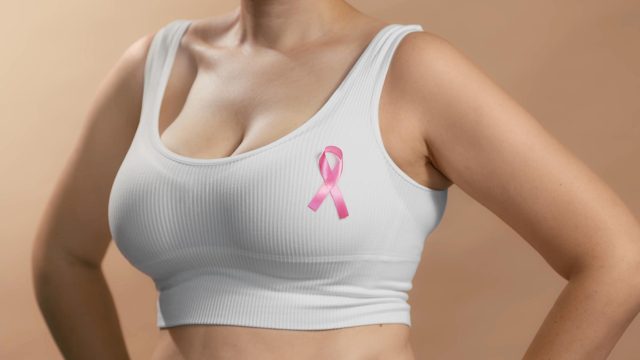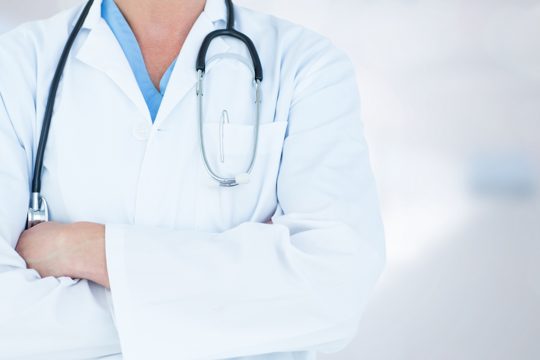6 Early Warning Signs Of Breast Cancer
Breast cancer is a formidable foe. However, knowing the signs and symptoms can lead to early detection and treatment, which often means a better outcome.
Here are six early warning signs of breast cancer that every woman should be aware of. Breast cancer is undeniably a formidable foe, an adversary that has haunted the lives of many women around the globe. It's a silent predator that creeps up without any warning, often making its presence known when it's already too late. However, there's a silver lining in this gloomy cloud. Armed with knowledge and awareness, we have the capability to stand up to this adversary. Understanding the signs and symptoms can be our first line of defense, leading to early detection, and subsequently, prompt and effective treatment.

This early action often spells the difference between life and death, transforming a bleak prognosis into a story of survival and hope. It is of utmost importance that every woman, regardless of age or family history, be cognizant of the six early warning signs of breast cancer.
This knowledge can be the key to unlocking a future free from the shackles of this dreaded disease. It's not just about being aware, but also about being proactive in monitoring any changes in your body, and promptly seeking medical advice when something doesn't feel right. So, let's delve into these warnings - these whispers from your body that something might be amiss. Because in the battle against breast cancer, knowledge is power, vigilance is a weapon, and early detection is the best form of defense. A woman armed with this information is a warrior, capable of not just fighting, but defeating breast cancer.
1. A New Lump in Your Breast
The presence of a new lump in your breast that feels different from surrounding tissue is one of the most common warning signs of breast cancer. Any new lump or hard knot should be checked by a healthcare professional.
Breast cancer is an alarmingly prevalent disease that can often be detected early through self-examination. One of the most common red flags is the sudden appearance of a new lump in your breast. This lump is typically distinguishable because it feels substantially different from the surrounding tissue. Rather than dismissing it as benign or ignoring it out of fear, it is crucial to acknowledge this change in your body and take immediate action. The emergence of a new lump or a hard knot could very well be your body signaling an underlying issue that needs immediate attention. This warning sign should never be overlooked or taken lightly. It's essential to remember that early detection is key in the fight against breast cancer. So, any noticeable changes in your breast should be promptly addressed.

Once you find a lump or hard knot that wasn't previously there, the next crucial step is to consult with a healthcare professional. They possess the requisite knowledge and equipment to conduct a thorough examination, providing a definitive diagnosis.
Rather than succumbing to panic or uncertainty, seeking medical advice will ensure you either obtain peace of mind or get the early treatment you need. Their expertise can guide you towards the right path, whether it's a false alarm or a call to immediate action. In conclusion, vigilance and prompt action are pivotal weapons in the fight against breast cancer. If you notice a new lump in your breast that feels different from the surrounding tissue, it's crucial not to ignore this warning sign. Instead, reach out to a healthcare professional who can provide the necessary guidance and care. Remember, in the battle against breast cancer, you are your first line of defense, and early detection can significantly increase your chances of successful treatment.
2. Thickening or Swelling of the Breast
Noticeable swelling or thickening in the breast that is unusual for your menstrual cycle can be a sign of breast cancer. This thickening or swelling may be small and localized, or affect a larger area.
Indeed, a noticeable swelling, thickening or lump in the breast that seems irregular or inconsistent with your normal menstrual cycle should not be dismissed, as it could potentially be a sign of breast cancer. Often, this thickening or swelling can be rather small and localized, detectable only by keen observation or touch. However, in some cases, it could also affect a larger area of the breast, making it more visible or palpable. It's important to remember that our bodies can undergo various changes due to fluctuating hormone levels, stress, and other factors. However, any changes in the breast that stand out as unusual or persist over time, such as this thickening or swelling, should always be evaluated by a healthcare provider.

Prompt detection is key when dealing with conditions like breast cancer, therefore, regular self-checks and mammograms are essential. Moreover, understanding your body and its regular patterns can help you identify any irregularities or changes that may occur over time.
It's not just about detecting lumps; changes in the skin texture, size, or shape of the breast, nipple discharge, or even unexplained pain in the breast or armpit can be potential signs of breast cancer. Always remember, when in doubt, it's better to seek medical advice. It's about vigilance, not paranoia. Your health and peace of mind are always worth it.
3. Swollen Lymph Nodes Under the Arm or Near the Collarbone
Swelling or lumps in lymph nodes under the arm or near the collarbone can indicate that cancer cells have spread to these areas. If you notice any changes in these areas, its important to consult with a healthcare provider.
Noticing any unusual swelling or lumps in the lymph nodes located under your arm or near the collarbone can often serve as a significant warning sign that cancer cells may have infiltrated these areas. This abnormal enlargement or growth can result from the body's attempt to fend off an infection, or more worryingly, it could be a telltale sign of a more serious health concern such as cancer. The lymph nodes act as filters for harmful substances and play a crucial role in the body's immune response. They can often become swollen in response to illness or infection. However, persistent swelling could potentially indicate that the body is fighting a more serious disease, such as cancer. Therefore, any noticeable changes in the size or sensitivity of these lymph nodes should not be dismissed lightly. If you've identified any alterations in these areas, it's essential to seek immediate medical attention.

It's always better to err on the side of caution when it comes to your health. Consulting with a healthcare provider will enable you to get a professional assessment of your condition.
This could involve a physical examination, blood tests, or imaging tests to determine the cause of the swelling, and if necessary, appropriate treatment can be initiated promptly. Remember, early detection is key in managing and treating many health issues, including cancer. So, never hesitate to reach out to a healthcare professional if you notice any unusual changes in your body. Act on your observations and take proactive steps towards safeguarding your health. Better safe than sorry, as the saying goes.
4. Skin Changes on the Breast
Skin changes on the breast, such as redness, pitting (skin that looks like an orange peel), or flaking and itching of the nipple can be symptoms of breast cancer. Any noticeable changes to the skin on your breasts should be evaluated by a healthcare professional.
In the realm of breast health, it's crucial to be aware of the diverse range of symptoms that could potentially indicate the presence of breast cancer. An array of skin changes on the breast can act as telltale signs, and these are not limited to the traditionally recognized lumps or swelling. Manifestations such as redness, a certain kind of textural change known as pitting (where the skin starts to resemble the uneven surface of an orange peel), or the flaking and itching of the nipple area could indeed signal the advent of breast cancer. Moreover, these subtle changes can often go unnoticed unless one is vigilant about conducting regular self-examinations and has a clear understanding of how their breasts normally look and feel. It's important to note that breast cancer isn't discriminatory - it can affect anyone, regardless of age or gender.

Hence, any noticeable, even minor alterations to the skin on your breasts should be taken seriously and not dismissed as trivial. In such instances, it is strongly recommended to seek the advice of a healthcare professional without delay.
A medical expert can perform a comprehensive examination, conduct necessary tests and provide an accurate diagnosis. Early detection is instrumental in successful treatment and recovery from breast cancer. Therefore, familiarizing yourself with the potential signs and symptoms, staying alert to any changes, and seeking timely professional medical advice should be integral parts of your health routine.
5. Changes in Nipple Appearance
Changes in the appearance of your nipple, such as becoming inverted (turned inward) or changing in size or shape, could be a sign of breast cancer. Its important to note any changes and discuss them with your healthcare provider.
Taking note of alterations in the physical features of your nipple is of utmost importance, as these transformations could potentially be an indication of a serious medical condition like breast cancer. One such change could be the inversion of your nipple, where it seems as though it has turned inward, or a shift in its size or shape. These changes can be subtle and might be easily missed if you're not vigilant about your breast health. It is crucially important to pay close attention to your body, and particularly to any transformations that you notice in your breasts. These changes could be the first signal that your body is trying to alert you about an underlying issue. Even minor modifications in the appearance of your nipple should not be overlooked.

They could be your body's way of signaling that something isn't right and warrant immediate attention. Healthcare professionals emphasize the significance of self-awareness when it comes to breast health.
They recommend regular self-checks to identify any unusual changes at the earliest. If any such changes are identified, it's imperative to discuss them with your healthcare provider promptly. This early detection could potentially save your life, as breast cancer, when identified early, is much more likely to be effectively treated. Hence, it's a matter of not just safeguarding your health, but potentially your life as well. Remember, your body often knows when something is amiss, and it's our job to listen attentively.
6. Nipple Discharge
Nipple discharge, especially when its bloody or clear and occurs without squeezing the nipple, can be a warning sign of breast cancer. Any unusual discharge should be reported to your healthcare provider.
Let me bring to your attention a health concern that often goes unnoticed but is extremely significant. Nipple discharge, particularly when it's bloody, clear, or even occurs without applying any pressure to the nipple, is more than just a common irregularity. It can be a crucial early warning sign of a potentially serious health condition, such as breast cancer. It's incredibly important to understand that this symptom should never be brushed off or ignored. It could discreetly indicate a developing abnormality within the breast tissue that might require immediate medical attention. So, if you ever notice any unusual discharge, it's absolutely critical that you take it seriously.

The best course of action in such scenarios is to promptly report this to your healthcare provider. Your doctor can carry out the necessary examinations and provide you with the most accurate diagnosis.
They can further guide you on the subsequent steps to take, whether it's further testing, monitoring, or treatment. Remember, early detection is key when it comes to managing and treating breast cancer. So, keep a vigilant eye on any changes in your body and always maintain open communication with your healthcare provider. This is not just a simple health tip, but a call to action to prioritize your health. Your well-being should always be your number one concern.
Should You Do Self-Exams?
Performing regular breast self-exams can help you familiarize yourself with how your breasts normally look and feel, making it easier to notice any changes. While self-exams are not a substitute for screenings by a healthcare provider, they can play an important role in early detection.
In the quest for health awareness, performing regular breast self-exams acts as a crucial tool in empowering you to understand the normal look and feel of your breasts. This familiarity aids in detecting any unusual changes, subtle or significant, that may occur over time. It's like taking the reins of your health into your own hands, allowing you to be an active participant in your overall wellbeing. While these self-exams serve an important purpose, it is crucial to remember that they are not a stand-alone solution. They should not be used as a substitute for regular screenings and check-ups by a healthcare provider. These professional examinations are thorough and can detect issues that might be missed during a self-exam.

Hence, while self-exams are an important tool, they should be complemented by regular professional screenings. Additionally, self-exams can play a pivotal role in early detection.
Early detection of breast cancer significantly increases the chances of successful treatment and survival. By taking a few minutes each month for a self-exam, you are taking an important step towards preventative health. Thus, the practice of self-exams, when combined with periodic visits to a healthcare provider, can form a robust strategy for maintaining breast health. In conclusion, regular self-exams empower you, aid in early detection, and contribute to a proactive approach to your health, but they should always be paired with regular screenings from a healthcare professional.
How Often Do You Need A Mammogram?
The frequency of mammograms can depend on factors such as age and risk. Generally, women aged 50-74 should have a mammogram every two years.
Women aged 40-49 or with a high risk of breast cancer should consult with their healthcare provider to determine the best screening schedule. The frequency at which mammograms are conducted can hinge on various factors, most prominently age and risk levels. As a general rule of thumb, women who fall within the age range of 50-74 are advised to have a mammogram every two years. This particular recommendation is based on extensive research and experts' consensus that it effectively balances the benefits and potential harms of mammography. However, the story changes slightly for women who are in the age bracket of 40-49 or for those who have been identified as having a high risk for breast cancer. For these women, the best course of action is to have a detailed, candid conversation with their healthcare provider.

This is due to the fact that individual health histories and risk factors can greatly influence the ideal timing and frequency of mammograms. In light of this, personalized screening schedules are often the most effective approach to ensuring optimal health outcomes.
Screening is a powerful tool in our arsenal against breast cancer, but its effectiveness hinges on its appropriate use. Hence, understanding the nuances of when and how often to screen is crucial. Moreover, it is important to remember that while mammograms can play a significant role in early detection, they are not the only preventive measure. Regular self-examinations and maintaining an overall healthy lifestyle are also key components of a comprehensive breast health strategy. Thus, women of all ages should remain proactive in their approach to breast health, and continue to stay abreast with the latest research and recommendations.
About us
Welcome to HealsHub! Your go-to source for all things related to health and wellness! We're here to help you lead a healthier, happier life by providing you with the latest news, research, and advice on topics like nutrition, fitness, mental health, and more. Our mission is to empower you to take control of your health and well-being through education and inspiration. Whether you're looking to lose weight, build muscle, manage stress, or simply learn more about how your body works, you'll find everything you need right here on healshub.com. We believe that everyone deserves to live a healthy, fulfilling life, and we're committed to providing you with the tools and resources you need to achieve your goals. So take a look around, explore our articles and resources, and start your journey towards better health today!

